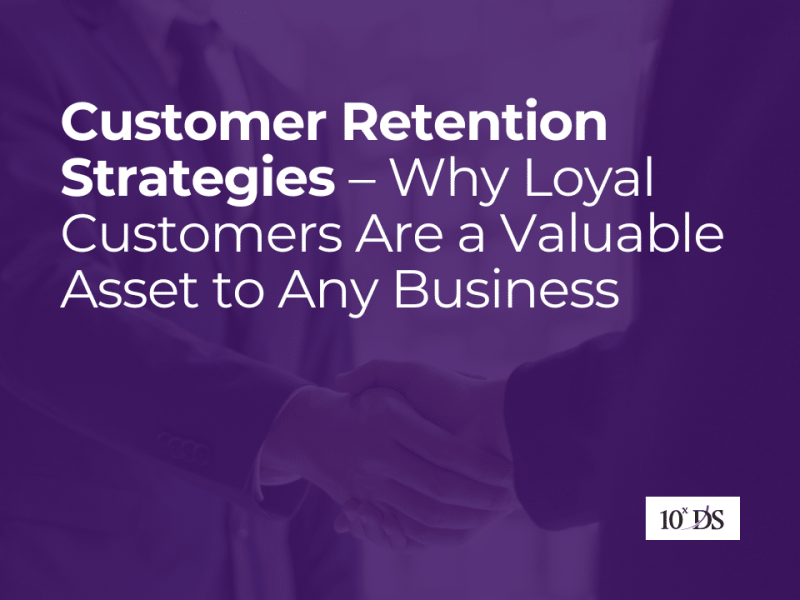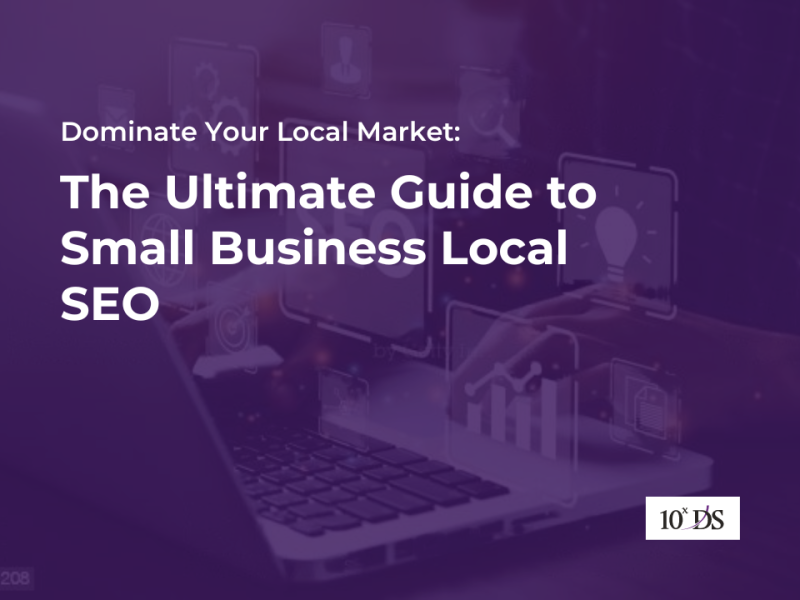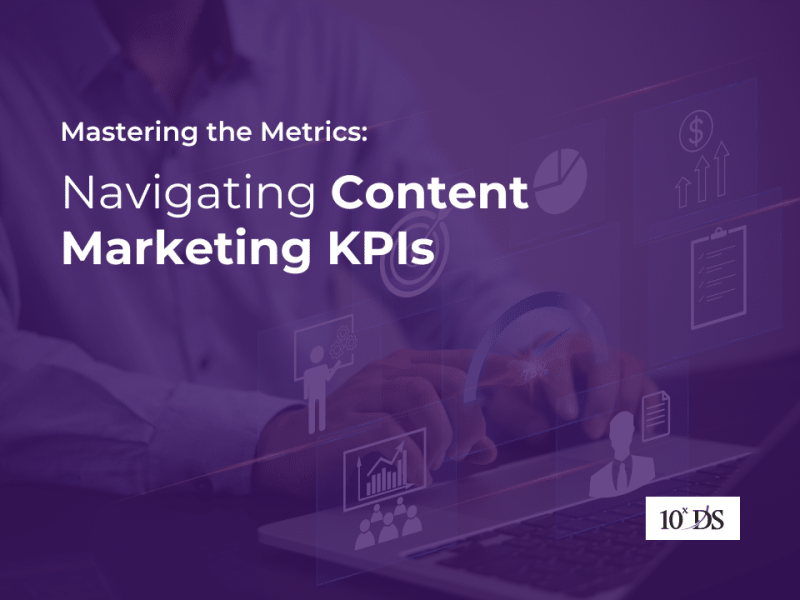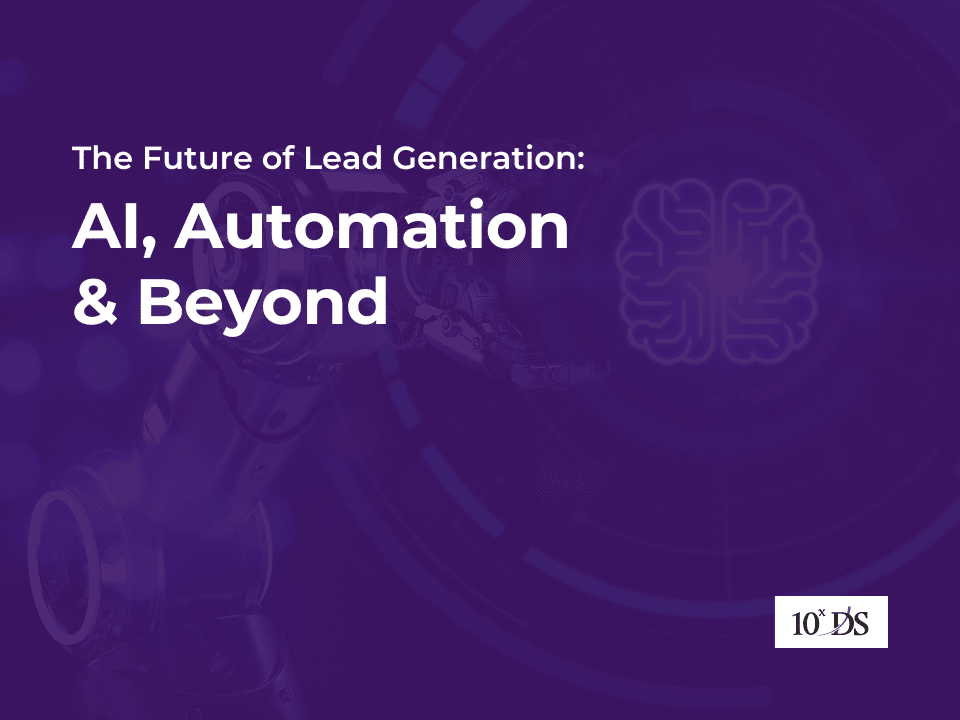
The Future of Lead Generation: AI, Automation & Beyond
Lead generation is the lifeline of any business, yet many marketers struggle with it. Simply put, leads are potential customers who have shown interest in your offerings and capturing them requires a strategic approach. Effective lead generation fuels business growth by ensuring a steady pipeline of prospects, mitigating customer churn, and driving revenue. Businesses with strong lead generation strategies see their revenues more than double. With the right approach, businesses can convert leads into loyal customers, ensuring sustained success.
Traditional methods, while still valuable, may not suffice in an environment where technology and consumer behaviours are constantly changing. To stay ahead, it’s essential to explore unconventional, technology-driven lead generation strategies that can set your business apart. Here we discuss a few of such strategies that you might not be using yet:
1. How AI-Powered Chatbots & Agentic AI Boost Customer Engagement and Sales
AI-powered chatbots have transformed how businesses connect with potential customers. In today’s fast-paced digital world, people expect quick answers and seamless interactions—and chatbots deliver exactly that. By responding instantly, chatbots engage visitors, answer questions, collect visitor details, qualify leads, schedule appointments, and guide them toward a decision—ensuring businesses don’t miss out on valuable opportunities.
Taking this further, Agentic AI enhances customer interactions by handling more complex queries, providing personalized recommendations, processing transactions, and managing follow-ups. Unlike traditional chatbots, Agentic AI adapts and learns, delivering human-like conversations while automating critical customer touchpoints.
For industries like e-commerce, healthcare, finance, and real estate, these AI-driven solutions provide 24/7 support, freeing up human agents for strategic tasks. This ensures a smarter, more efficient, and scalable customer experience—driving higher satisfaction and conversions.
The next wave of lead generation is powered by Agentic AI—AI-driven assistants that go beyond chatbots. AI can qualify leads, schedule meetings, personalize outreach, and nurture prospects autonomously. Businesses adopting predictive analytics, AI-driven sales automation, and chatbot-driven engagement will gain a competitive edge in lead generation.
2. Leveraging Technographics for Smarter Marketing
Understanding your target audience’s technology preferences and behaviours—known as technographics—can greatly improve your marketing strategy. By analyzing the devices, software, and applications your potential customers use, businesses can craft messaging and offers that align with their technological habits.
This data-driven personalization enhances engagement and increases conversion rates by ensuring that marketing efforts resonate with how customers interact with technology. Whether it’s optimizing campaigns for mobile users, targeting businesses using specific software, or customizing offers based on tech adoption trends, technographics provide a strategic advantage in reaching the right audience effectively.
Industry-Specific Applications of Technographics in Marketing:
Technographics play a crucial role in shaping targeted marketing strategies across various industries. In B2B SaaS and IT services, businesses can identify companies using competitor software and offer them better solutions. E-commerce and retail brands can optimize ad campaigns by analyzing whether customers shop via mobile, desktop, or specific platforms, ensuring more effective engagement. In healthcare and telemedicine, compatibility with patients’ devices and preferred software enhances digital health platform accessibility. Similarly, finance and banking institutions can refine digital banking experiences based on customers’ device usage. Meanwhile, real estate and Properties Tech companies can tailor their marketing strategies depending on whether users search for properties on mobile or desktop, delivering a seamless and targeted approach.
3. Enhancing Engagement Through Interactive Content & Content Upgrades
Traditional, static content is losing its impact as audiences seek more engaging and personalized experiences. Interactive content—such as quizzes, polls, calculators, and interactive infographics—grabs attention, encourages participation, and keeps users engaged longer.
Beyond engagement, these tools serve as powerful lead generators by prompting users to input their preferences for personalized results. Content upgrades—such as downloadable checklists, e-books, or templates—offer additional insights in exchange for visitor details, enhancing user experience while generating high-quality leads.
4. Hosting Virtual Events and Webinars: A Proven Strategy for Lead Generation
Virtual events and webinars have become essential tools for businesses aiming to engage audiences and generate leads. They provide a platform to showcase expertise, deliver value, and collect contact information. Recorded sessions can also be repurposed as on-demand content, extending their lead generation potential.
5. Conversion Strategies: Exit-Intent Popups & Referral Programs
Exit-intent technology detects when a user is about to leave your website and triggers a targeted popup to capture their interest before they go. These popups can offer exclusive discounts, free resources, or newsletter subscriptions, reducing bounce rates and recovering lost opportunities.
Similarly, referral programs leverage trust and word-of-mouth marketing to attract high-quality leads. By offering incentives such as discounts, exclusive access, or premium services, businesses can encourage existing customers to refer new clients, creating a cost-effective acquisition channel.
6. Optimizing for Voice Search
With voice-activated devices becoming more common, adapting content for voice search is essential. Unlike traditional searches, voice queries are longer, conversational, and question based. To optimize for this trend, businesses should use natural language and long-tail keywords to align with conversational queries, structure content in an FAQ format for better visibility, and enhance local SEO to ensure they appear in relevant regional searches.
7. Leveraging Video Marketing
Video content is one of the most engaging and effective ways to attract and educate potential leads. Informative and entertaining videos about products or services simplify complex concepts and build trust through visual storytelling.
Optimizing video content with SEO-friendly titles, descriptions, and captions enhances discoverability, ensuring that valuable content reaches the right prospects. Platforms like YouTube, LinkedIn, and social media allow targeted advertising to reach specific audiences based on demographics, interests, and behavior.
8. Implementing Retargeting & Personalized Email Campaigns
Not all visitors convert on their first visit, making retargeting crucial for re-engaging potential leads. By displaying personalized ads to users who have previously interacted with your website, businesses can stay top-of-mind.
Personalized email campaigns further enhance engagement by segmenting audiences based on user behavior and preferences. AI-driven automation ensures the right message reaches the right audience at the right time, improving open rates, click-throughs, and conversions.
By integrating AI, automation, and data-driven insights, businesses can create scalable, high-converting lead generation strategies that ensure long-term success.
9. Blockchain: Securing Lead Data & Enhancing Trust
Blockchain technology addresses one of the biggest challenges in lead generation—data integrity and privacy. With increasing concerns over fake leads, data breaches, and compliance regulations (like GDPR), blockchain can provide a decentralized and tamper-proof solution.
In real estate, blockchain verifies buyer and seller identities, preventing fraudulent listings and fake inquiries. Finance and banking leverage blockchain for secure, encrypted customer onboarding while ensuring compliance with KYC (Know Your Customer) regulations. B2B and SaaS companies benefit from its ability to prevent lead duplication and bot-driven form submissions, guaranteeing that businesses engage only with verified, high-quality leads. Meanwhile, in healthcare, blockchain secures patient data in telemedicine lead capture, ensuring compliance with HIPAA and other data privacy laws. By eliminating data manipulation and enhancing trust, blockchain is redefining how industries acquire and manage leads.
10. The Metaverse: Immersive Lead Engagement
The metaverse is redefining digital interactions, enabling businesses to engage leads through virtual reality (VR), 3D experiences, and AI-powered avatars.
- In retail and e-commerce, virtual showrooms enable customers to explore products in 3D, try them using augmented reality (AR), and make instant purchases.
- Education and training benefit from immersive webinars and virtual campuses, enhancing engagement for online courses and professional certifications.
- Automotive and real estate industries leverage virtual test drives and remote property tours, reducing sales cycles and boosting conversion rates.
- B2B events and networking are transformed by AI-driven virtual trade shows, interactive product demos, and real-time networking sessions, optimizing lead capture and engagement.
Lead Generation Strategies: Present vs. Future
Modern lead generation is evolving beyond traditional methods, leveraging AI, automation, and data-driven insights for precision and scalability. While current strategies focus on content marketing, social media, and targeted outreach, the future will be defined by hyper-personalization, predictive analytics, and immersive digital experiences. AI-powered interactions, blockchain-secured data, voice search optimization, and augmented reality will drive more efficient lead qualification and engagement. As businesses shift towards automation and AI-driven decision-making, lead generation will become more intelligent, seamless, and tailored to individual customer behaviours.
Present vs. Future Lead Generation: Feature Comparison
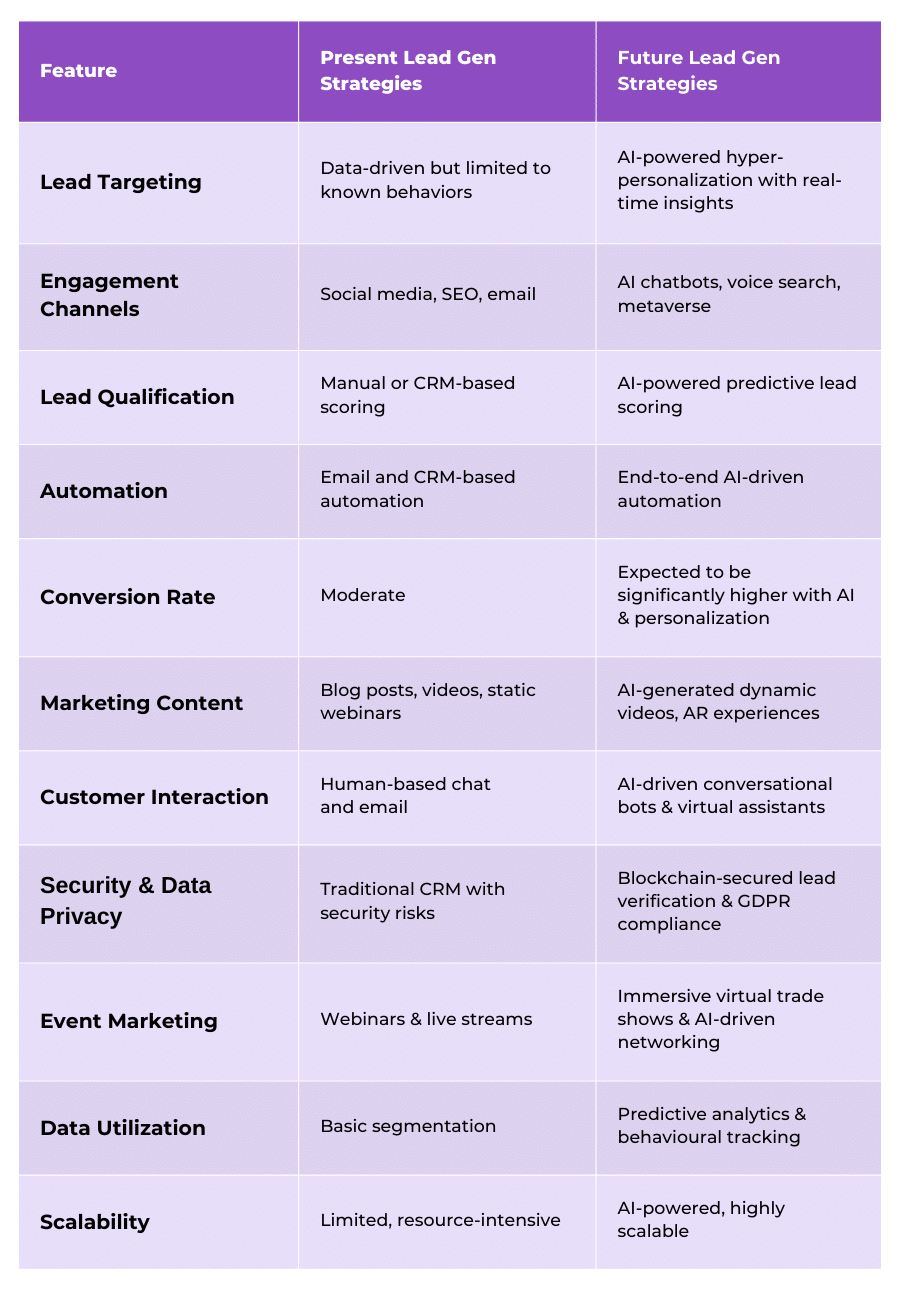
Final Thoughts
The future of lead generation is unfolding rapidly, and businesses that fail to adapt risk being left behind. AI, automation, and immersive digital experiences are no longer futuristic concepts—they are shaping the present and defining the competitive edge of tomorrow. The ability to predict customer intent, engage audiences in real time, and secure data with blockchain is revolutionizing how businesses attract and convert leads. Those who embrace these advancements will not only stay ahead but redefine industry standards. In a world where speed, precision, and personalization drive success, the question isn’t whether to evolve—but how fast you can.
Talk to our Digital Marketing Experts to learn more.
